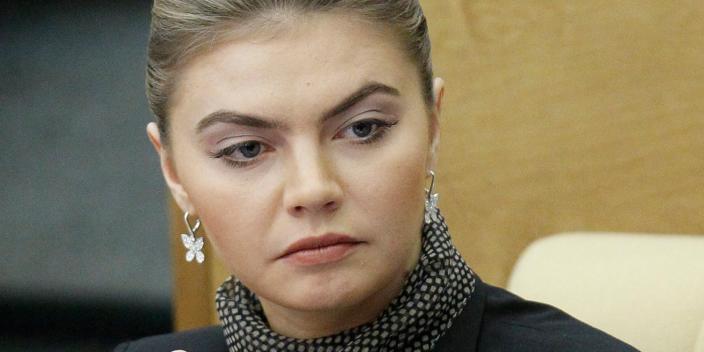
-
Alina Kabaeva, 39, is a retired rhythmic gymnast and former member of Russia’s lower parliament.
-
She is rumored to be Vladimir Putin’s longtime girlfriend, but the Kremlin has denied the claims.
-
Reports also say the two had a daughter in 2015.
Alina Kabaeva has earned notoriety as a decorated rhythmic gymnast, as a politician, and as a top executive of Russia’s largest media company.
But no facet of the 39-year-old’s life has put her in the international spotlight more than her long-rumored, never-confirmed relationship with Russian president Vladimir Putin, who celebrated his 70th birthday on Friday.
The Kremlin has put up a smoke screen in front of the alleged relationship, which dates back at least 14 years. In 2008, rumors began to circulate that Putin secretly divorced his wife to pursue a relationship with a gymnast almost half his age, according to The New York Times.
“I have always disliked those who, with their infected noses and erotic fantasies, break into other people’s private affairs,” Putin told reporters in 2008 when denying the rumors, according to The Times.
Still, the majority of the western order acknowledges Kabaeva’s ties to Putin.
In August, seven months after Russia invaded Ukraine, the US Treasury Department joined the UK, Canada, and European Union in sanctioning Kabaeva for her “close relationship” to Putin.
Here’s what we know about Kabaeva.
Her father was a professional football player.


Kabaeva was born on May 12, 1983, in Tashkent, the capital of Uzbekistan, according to her brief ESPN bio.
Sparse information from reliable sources exists online regarding Kabaeva’s upbringing.
According to a Russian business news outlet, Kabaeva’s father was a professional soccer player.
An online soccer database says that he played for the Pakhtakor Tashkent football club from 1980 to 1986, before he went on to play for the Dnipro football club for Ukraine in 1989.
Kabaeva also has a younger sister, Leysan Kavaeva.
Kabaeva was a highly decorated rhythmic gymnast, earning her the nickname, “Russia’s most flexible woman.”


Kabaeva was a highly talented rhythmic gymnast — a sport that involves gymnastics, dance, incredible flexibility, and control of a separate object such as a ball, hoop, or ribbon.
During her athletic career, Kabaeva won 21 European Championship medals, 14 World Championship medals, and two Olympic medals — one gold and one bronze.
She began training at the early age of 3, according to an archived bio page from Kabaeva’s personal website.
In 2001, Kabaeva was mired in a doping scandal after she tested positive for using furosemide, a diuretic that is sometimes used to mask the presence of performance-enhancing drugs in urine or to lose weight.
The athlete claimed that the presence of the drug came from a contaminated pill purchased at a local pharmacy, according to NPR. She was suspended in 2002 and was forced to return her medals from the 2001 World Championship.
Kabaeva continue to compete after her suspension and won an Olympic gold medal in 2004. She has not competed since 2007.
She joined Russia’s lower parliament, State Duma, in 2007.


Kabaeva entered politics in 2007 when she was elected a deputy in the State Duma, Russia’s lower parliament, according to Reuters.
The outlet reported at the time that she was not often seen at the headquarters located in Moscow.
According to NPR, she strongly advocated for a law that barred many Russian orphans from being adopted abroad.
Kabaeva requested an early departure from the legislature and left her position in 2014, The Moscow Times reported.
Kabaeva is the chairwoman of one of Russia’s largest media companies.


After she resigned from the State Duma, Kabaeva was appointed to head Russia’s National Media Group around September 2014.
According to The Guardian, the media company owned 25% of Channel One, Russia’s state-controlled television channel, along with stakes in other channels and newspapers.
The US Treasury Department described the company as “a pro-Kremlin empire of television, radio, and print organizations.”
The Guardian reported at the time that Kabaeva had no experience in media management.
Her relationship with Putin has never been confirmed.


Putin and Kabaeva have yet to confirm their long-rumored relationship that goes back at least 14 years.
The claims first came from an article in a Russian tabloid, The Moskovsky Korrespondent, in 2008, that stated Putin had plans to marry Kabaeva, according to The New York Times. Putin was then still married to Lyudmila Aleksandrovna Ocheretnaya.
Putin announced his divorce from Lyudmila in 2013.
Days after the report, which Putin and Kabaeva adamantly denied, the tabloid paper’s parent company said the publication will shut down due to “financial reasons.”
The Kremlin has also denied reports that Putin had his third child with Kabaeva around 2015 after the president’s whereabouts were unknown to the public for about a week.
“The information on the birth of a baby by Putin is untrue,” Putin’s press secretary told Forbes at the time.
Kabaeva was sanctioned by western governments amid Russia’s war against Ukraine.


In August, Kabaeva joined a long list of Russian elites and oligarchs who were sanctioned by western governments over Russia’s war against Ukraine.
UK, Canada, the European Union, and the US placed their own sanction against the former gymnast.
In its statement announcing the sanction, the Department of Treasury said “Kabaeva has a close relationship to Putin” and pointed to her position at the National Media Group.
According to NPR, the US sanction may not have had much impact on Kabaeva since it’s unclear what financial assets she has in the country.
Read the original article on Business Insider




